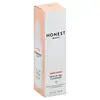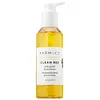What's inside
What's inside
 Key Ingredients
Key Ingredients

 Benefits
Benefits

 Concerns
Concerns

 Ingredients Side-by-side
Ingredients Side-by-side

Water
Skin ConditioningSodium Laurylglucosides Hydroxypropylsulfonate
CleansingGlycerin
HumectantSodium Methyl Cocoyl Taurate
CleansingCocamidopropyl Hydroxysultaine
CleansingSodium Chloride
MaskingSorbitol
HumectantSodium Lauryl Glucose Carboxylate
CleansingLauryl Glucoside
CleansingCalendula Officinalis Flower Extract
MaskingChamomilla Recutita Flower Extract
MaskingYucca Schidigera Root Extract
Skin ConditioningSaponaria Officinalis Extract
Skin ConditioningLeuconostoc/Radish Root Ferment Filtrate
AntimicrobialHydrolyzed Quinoa
Skin ConditioningLavandula Angustifolia Oil
MaskingLavandula Hybrida Oil
EmollientPelargonium Graveolens Flower Oil
MaskingPogostemon Cablin Leaf Oil
MaskingAnthemis Nobilis Flower Oil
MaskingCymbopogon Martini Oil
MaskingAbies Sibirica Oil
MaskingGluconolactone
Skin ConditioningPotassium Sorbate
PreservativeSodium Benzoate
MaskingCoconut Acid
CleansingSodium Citrate
BufferingCitric Acid
BufferingSorbic Acid
PreservativeLinalool
PerfumingWater, Sodium Laurylglucosides Hydroxypropylsulfonate, Glycerin, Sodium Methyl Cocoyl Taurate, Cocamidopropyl Hydroxysultaine, Sodium Chloride, Sorbitol, Sodium Lauryl Glucose Carboxylate, Lauryl Glucoside, Calendula Officinalis Flower Extract, Chamomilla Recutita Flower Extract, Yucca Schidigera Root Extract, Saponaria Officinalis Extract, Leuconostoc/Radish Root Ferment Filtrate, Hydrolyzed Quinoa, Lavandula Angustifolia Oil, Lavandula Hybrida Oil, Pelargonium Graveolens Flower Oil, Pogostemon Cablin Leaf Oil, Anthemis Nobilis Flower Oil, Cymbopogon Martini Oil, Abies Sibirica Oil, Gluconolactone, Potassium Sorbate, Sodium Benzoate, Coconut Acid, Sodium Citrate, Citric Acid, Sorbic Acid, Linalool
Water
Skin ConditioningSodium Lauroyl Methyl Isethionate
CleansingCocamidopropyl Hydroxysultaine
CleansingChamomilla Recutita Flower Water
MaskingDecyl Glucoside
CleansingMaltooligosyl Glucoside
Skin ConditioningLauryl Glucoside
CleansingGlycerin
HumectantHydrogenated Starch Hydrolysate
HumectantEchinacea Purpurea Root Extract
MoisturisingHoney Extract
HumectantPropolis Extract
Skin ConditioningRoyal Jelly Extract
Skin ConditioningHydrolyzed Sodium Hyaluronate
Skin ConditioningCalendula Officinalis Flower Extract
MaskingGlycyrrhiza Glabra Root Extract
BleachingAloe Barbadensis Leaf Juice
Skin ConditioningMelia Azadirachta Leaf Extract
Skin ConditioningLavandula Angustifolia Oil
MaskingLavandula Hybrida Oil
EmollientCurcumin
AntioxidantCurcuma Longa Root Extract
MaskingBetaine
HumectantSodium PCA
HumectantDisodium Cocoyl Glutamate
CleansingSodium Cocoyl Glutamate
CleansingCitric Acid
BufferingSodium Benzoate
MaskingAbies Sibirica Oil
MaskingCymbopogon Martini Oil
MaskingPelargonium Graveolens Oil
MaskingPogostemon Cablin Leaf Oil
MaskingCaramel
Cosmetic ColorantAnthemis Nobilis Flower Oil
MaskingOcimum Basilicum Flower/Leaf Extract
TonicOcimum Sanctum Leaf Extract
Skin ConditioningMelia Azadirachta Flower Extract
Skin ConditioningCorallina Officinalis Extract
Skin ConditioningAroma
Potassium Sorbate
PreservativeMaltodextrin
AbsorbentTrisodium Ethylenediamine Disuccinate
Sodium Chloride
MaskingSodium Phytate
Propanediol
SolventLinalool
PerfumingWater, Sodium Lauroyl Methyl Isethionate, Cocamidopropyl Hydroxysultaine, Chamomilla Recutita Flower Water, Decyl Glucoside, Maltooligosyl Glucoside, Lauryl Glucoside, Glycerin, Hydrogenated Starch Hydrolysate, Echinacea Purpurea Root Extract, Honey Extract, Propolis Extract, Royal Jelly Extract, Hydrolyzed Sodium Hyaluronate, Calendula Officinalis Flower Extract, Glycyrrhiza Glabra Root Extract, Aloe Barbadensis Leaf Juice, Melia Azadirachta Leaf Extract, Lavandula Angustifolia Oil, Lavandula Hybrida Oil, Curcumin, Curcuma Longa Root Extract, Betaine, Sodium PCA, Disodium Cocoyl Glutamate, Sodium Cocoyl Glutamate, Citric Acid, Sodium Benzoate, Abies Sibirica Oil, Cymbopogon Martini Oil, Pelargonium Graveolens Oil, Pogostemon Cablin Leaf Oil, Caramel, Anthemis Nobilis Flower Oil, Ocimum Basilicum Flower/Leaf Extract, Ocimum Sanctum Leaf Extract, Melia Azadirachta Flower Extract, Corallina Officinalis Extract, Aroma, Potassium Sorbate, Maltodextrin, Trisodium Ethylenediamine Disuccinate, Sodium Chloride, Sodium Phytate, Propanediol, Linalool
 Reviews
Reviews

Ingredients Explained
These ingredients are found in both products.
Ingredients higher up in an ingredient list are typically present in a larger amount.
Abies Sibirica Oil is a fragrance and is an oil.
This oil is created by distilling the dried flower heads of the Roman Chamomile flower.
Chamomile is rich in antioxidants and has anti-inflammatory properties. Several compounds found in chamomile help with soothing, such as bisbolol.
Calendula Officinalis Flower Extract comes from the common Marigold plant. This ingredient is a skin conditioner.
Marigolds contain flavonoids. Flavonoids are a group of substances found naturally in plants. They possess antioxidant and inflammation properties.
This ingredient soothes skin inflammation by inhibiting inhibiting a part of the inflammation process.
Marigolds have been used in traditional medicine throughout Asia and Europe.
Learn more about Calendula Officinalis Flower ExtractCitric Acid is an alpha hydroxy acid (AHA) naturally found in citrus fruits like oranges, lemons, and limes.
Like other AHAs, citric acid can exfoliate skin by breaking down the bonds that hold dead skin cells together. This helps reveal smoother and brighter skin underneath.
However, this exfoliating effect only happens at high concentrations (20%) which can be hard to find in cosmetic products.
Due to this, citric acid is usually included in small amounts as a pH adjuster. This helps keep products slightly more acidic and compatible with skin's natural pH.
In skincare formulas, citric acid can:
While it can provide some skin benefits, research shows lactic acid and glycolic acid are generally more effective and less irritating exfoliants.
Most citric acid used in skincare today is made by fermenting sugars (usually from molasses). This synthetic version is identical to the natural citrus form but easier to stabilize and use in formulations.
Read more about some other popular AHA's here:
Learn more about Citric AcidCocamidopropyl Hydroxysultaine is a synthetic cleansing agent, though it is derived from coconut oil.
It is used to enhance the texture of products by boosting lather and thickening the texture. As a cleanser, Cocamidopropyl Hydroxysultaine is mild.
Cymbopogon Martini Oil is the volatile oil expressed from the herb palmarosa, Cymbopogon martini, Gramineae
Glycerin is already naturally found in your skin. It helps moisturize and protect your skin.
A study from 2016 found glycerin to be more effective as a humectant than AHAs and hyaluronic acid.
As a humectant, it helps the skin stay hydrated by pulling moisture to your skin. The low molecular weight of glycerin allows it to pull moisture into the deeper layers of your skin.
Hydrated skin improves your skin barrier; Your skin barrier helps protect against irritants and bacteria.
Glycerin has also been found to have antimicrobial and antiviral properties. Due to these properties, glycerin is often used in wound and burn treatments.
In cosmetics, glycerin is usually derived from plants such as soybean or palm. However, it can also be sourced from animals, such as tallow or animal fat.
This ingredient is organic, colorless, odorless, and non-toxic.
Glycerin is the name for this ingredient in American English. British English uses Glycerol/Glycerine.
Learn more about GlycerinLauryl Glucoside sugar- and lipid-based cleansing agent. It is created from glucose and lauryl alcohol.
This ingredient is a surfactant, making it easier to rinse oil, dirt, and other pollutants away.
A British study found lauryl glucoside to cause skin sensitivity for some people. We recommend speaking with a professional if you have concerns.
Other names for this ingredient include "Lauryl Polyglucose", "Lauryl glycoside", and "D-Glucopyranoside".
Learn more about Lauryl GlucosideLavandula Angustifolia Oil is more commonly known as lavender essential oil. It is considered a fragrancing ingredient.
Lavender imparts a famous scent. While the smell is lovely, this ingredient and may sensitize skin in topical products. This is because about 85% of the oil is made up of linalool and linalyl acetate.
When exposed to air, these two compounds become strong allergens. This ingredient exhibits cytotoxicity at low concentrations; amounts of 0.25% have been shown to damage skin cells.
A study from Japan found this ingredient caused lavender sensitivity after widespread exposure.
Lavender essential oil has some antimicrobial, antibacterial, and anti-inflammatory properties. However, the cons of this ingredient may outweight the pros.
More research is needed to confirm lavender essential oil's effects when used in aromatherapy.
Lavandula Angustifolia is known as the English Lavender and famous for creating purple fields in Provence, France.
Learn more about Lavandula Angustifolia OilLavandula Hybrida Oil is an oil.
Linalool is a fragrance and helps add scent to products. It's derived from common plants such as cinnamon, mint, citrus, and lavender.
Like Limonene, this ingredient oxidizes when exposed to air. Oxidized linalool can cause allergies and skin sensitivity.
This ingredient has a scent that is floral, spicy tropical, and citrus-like.
Learn more about LinaloolThis ingredient is commonly known as Patchouli oil.
Patchouli exhibits slight antibacterial and antifungal activity from its patchoulol and alpha-patchoulene content.
However, it also contains known skin-irritating fragrances. A study from 2015 found limonene and camphor as active components of this ingredient.
Limonene and camphor are both known EU allergens.
Learn more about Pogostemon Cablin Leaf OilPotassium Sorbate is a preservative used to prevent yeast and mold in products. It is commonly found in both cosmetic and food products.
This ingredient comes from potassium salt derived from sorbic acid. Sorbic acid is a natural antibiotic and effective against fungus.
Both potassium sorbate and sorbic acid can be found in baked goods, cheeses, dried meats, dried fruit, ice cream, pickles, wine, yogurt, and more.
You'll often find this ingredient used with other preservatives.
Learn more about Potassium SorbateSodium Benzoate is a preservative. It's used in both cosmetic and food products to inhibit the growth of mold and bacteria. It is typically produced synthetically.
Both the US FDA and EU Health Committee have approved the use of sodium benzoate. In the US, levels of 0.1% (of the total product) are allowed.
Sodium benzoate works as a preservative by inhibiting the growth of bacteria inside of cells. It prevents the cell from fermenting a type of sugar using an enzyme called phosphofructokinase.
It is the salt of benzoic acid. Foods containing sodium benzoate include soda, salad dressings, condiments, fruit juices, wines, and snack foods.
Studies for using ascorbic acid and sodium benzoate in cosmetics are lacking, especially in skincare routines with multiple steps.
We always recommend speaking with a professional, such as a dermatologist, if you have any concerns.
Learn more about Sodium BenzoateChances are, you eat sodium chloride every day. Sodium Chloride is also known as table salt.
This ingredient has many purposes in skincare: thickener, emulsifier, and exfoliator.
You'll most likely find this ingredient in cleansers where it is used to create a gel-like texture. As an emulsifier, it also prevents ingredients from separating.
There is much debate on whether this ingredient is comedogenic. The short answer - comedogenic ratings don't tell the whole story. Learn more about comegodenic ratings here.
The concensus about this ingredient causing acne seems to be divided. Research is needed to understand if this ingredient does cause acne.
Scrubs may use salt as the primary exfoliating ingredient.
Learn more about Sodium ChlorideWater. It's the most common cosmetic ingredient of all. You'll usually see it at the top of ingredient lists, meaning that it makes up the largest part of the product.
So why is it so popular? Water most often acts as a solvent - this means that it helps dissolve other ingredients into the formulation.
You'll also recognize water as that liquid we all need to stay alive. If you see this, drink a glass of water. Stay hydrated!
Learn more about Water